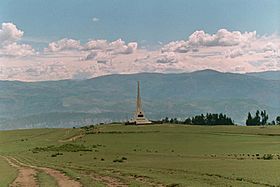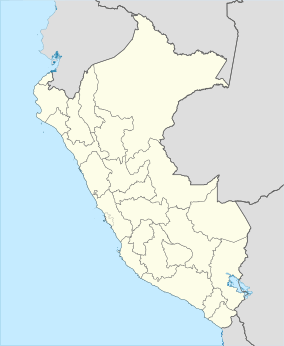Pampas de Ayacucho Historic Sanctuary facts for kids
Quick facts for kids Pampas de Ayacucho Historic Sanctuary |
|
|---|---|
| Santuario Histórico Pampas de Ayacucho | |

Partial view of the historic sanctuary.
|
|
| Location | Ayacucho Region |
| Nearest city | Quinua |
| Area | 3 km2 (1.16 sq mi) |
| Established | 14 August 1980 |
| Governing body | SERNANP |
| Website | Santuario Histórico Pampas de Ayacucho |
The Pampas de Ayacucho Historic Sanctuary is a special protected area in Peru. It is located near the town of Quinua in the Ayacucho Region. This sanctuary covers an area of 3 square kilometers (about 1.2 square miles).
It was created in 1980 to protect the important place where the Battle of Ayacucho happened. This battle was a very big event in the history of South America. The sanctuary helps us remember this important moment and also protects the nature of the area.
Contents
What is a Historic Sanctuary?
A historic sanctuary is a type of protected area. It is set aside by a government to protect a place that is important for its history, culture, or natural beauty. The Pampas de Ayacucho Historic Sanctuary protects both a famous battlefield and the local plants and animals.
The Battle of Ayacucho: A Key Moment
The Battle of Ayacucho was a very important fight that took place on December 9, 1824. It was the last major battle in the Peruvian War of Independence. This war was fought to free Peru from Spanish rule.
Who Fought in the Battle?
The battle was fought between two main groups:
- The Patriot army, led by Antonio José de Sucre. They wanted independence for Peru.
- The Royalist army, who were loyal to the Spanish king.
Why Was the Battle Important?
The Patriot army won the Battle of Ayacucho. This victory was a huge step for South America because it led to the final independence of Peru. It also helped secure the freedom of other South American countries. The battle marked the end of Spanish rule in most of South America.
After the battle, a document called the Capitulation of Ayacucho was signed. This document officially ended the fighting and recognized Peru's independence.
Nature and Wildlife at the Sanctuary
Besides its historical importance, the Pampas de Ayacucho Historic Sanctuary is also home to many plants and animals. The word "pampas" means wide, flat grasslands. This area has a unique ecosystem.
Plants You Might See
The sanctuary's grasslands are filled with different types of plants. You can find various grasses and small shrubs that are adapted to the local climate. These plants provide food and shelter for the animals living there.
Animals You Might Spot
The sanctuary is a home for several animal species. Some of the animals you might see include:
- Vizcachas: These are rodents that look a bit like rabbits with long tails.
- Andean foxes: Also known as culpeos, these foxes are native to South America.
- Skunks: You might spot these small mammals, known for their strong scent.
- Birds: Many different bird species live in the sanctuary, flying over the open plains.
Protecting this area helps these animals and plants continue to thrive in their natural home.
Visiting the Sanctuary Today
Today, the Pampas de Ayacucho Historic Sanctuary is a place where people can learn about history and enjoy nature. There is a large monument at the site that honors the heroes of the Battle of Ayacucho. Many visitors come to remember the past and appreciate the beautiful landscape.
The sanctuary is a great place to visit if you are interested in history, nature, or both!
See also
 In Spanish: Santuario histórico de la Pampa de Ayacucho para niños
In Spanish: Santuario histórico de la Pampa de Ayacucho para niños
 | Tommie Smith |
 | Simone Manuel |
 | Shani Davis |
 | Simone Biles |
 | Alice Coachman |


